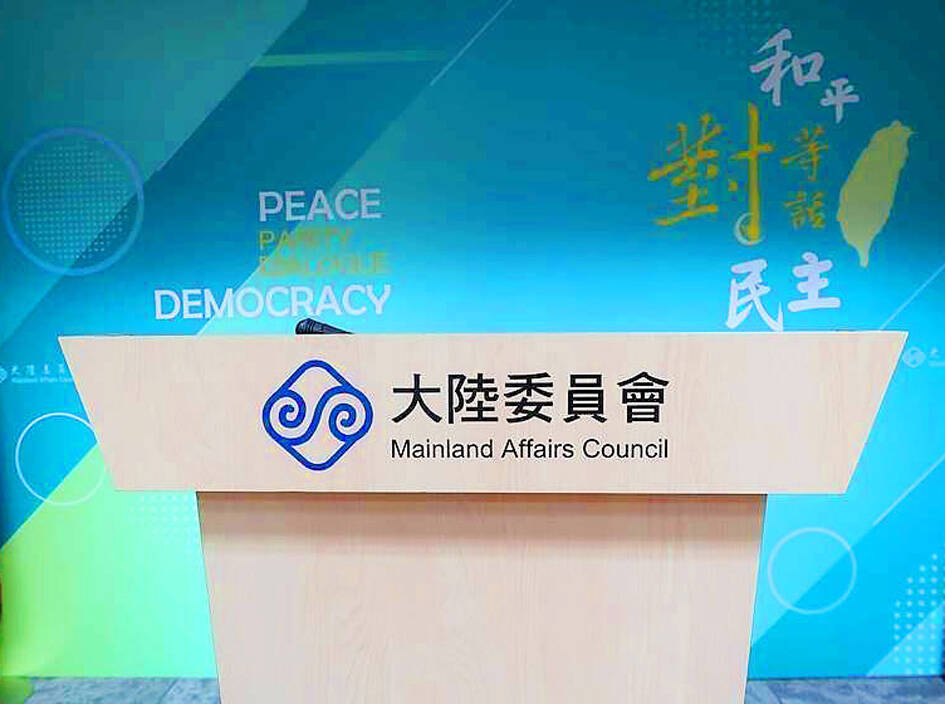The Mainland Affairs Council (MAC) yesterday urged the Chinese authorities to protect the legal interests of a Taiwanese man who is being investigated in China for his alleged role in a fraud case.
China should observe the principle of presumption of innocence and respect the Taiwanese man’s legal rights during its investigation, the MAC said.
The statement came after China’s Taiwan Affairs Office (TAO) said in a news release that 22-year-old Kuo Yu-hsuan (郭宇軒) is being investigated in China for alleged fraud.

Photo: Chung Li-hua, Taipei Times
The TAO said the Chinese authorities would protect Kuo’s interests under the law, but it did not provide any details on the case or the actions he was allegedly involved in nor did they disclose where he was being held.
Kuo went missing after he arrived in Shanghai on Aug. 27, and his friends and relatives have not been able to make contact with him since then.
The MAC expressed dissatisfaction with the TAO as the Chinese agency did not disclose any information about Kuo’s situation until almost one month after he went missing.
The MAC also blamed the Chinese authorities for not informing the Taiwanese authorities that Kuo’s personal freedom had been restricted.
The TAO failed to provide information about Kuo’s situation until people in Taiwan expressed concerns about his safety, it said.
On Thursday last week, MAC Deputy Minister Liang Wen-chieh (梁文傑) said that Kuo went to China with his friends.
Kuo’s family reported him missing to police when they could not contact him, while Taiwan’s Straits Exchange Foundation wrote a letter to its Chinese counterpart — the Association for Relations Across the Taiwan Straits — amid concerns about his safety.
Kuo’s older sister on social media said her brother told his family he had arrived safely in Shanghai, but they were not able to make contact with him by phone or online messenger services after that.
Kuo’s sister added that she did not rule out the possibility that her brother was being defrauded or was simply arrested while he was just visiting.

‘DENIAL DEFENSE’: The US would increase its military presence with uncrewed ships, and submarines, while boosting defense in the Indo-Pacific, a Pete Hegseth memo said The US is reorienting its military strategy to focus primarily on deterring a potential Chinese invasion of Taiwan, a memo signed by US Secretary of Defense Pete Hegseth showed. The memo also called on Taiwan to increase its defense spending. The document, known as the “Interim National Defense Strategic Guidance,” was distributed this month and detailed the national defense plans of US President Donald Trump’s administration, an article in the Washington Post said on Saturday. It outlines how the US can prepare for a potential war with China and defend itself from threats in the “near abroad,” including Greenland and the Panama

The Chinese Nationalist Party (KMT) is maintaining close ties with Beijing, the Democratic Progressive Party (DPP) said yesterday, hours after a new round of Chinese military drills in the Taiwan Strait began. Political parties in a democracy have a responsibility to be loyal to the nation and defend its sovereignty, DPP spokesman Justin Wu (吳崢) told a news conference in Taipei. His comments came hours after Beijing announced via Chinese state media that the Chinese People’s Liberation Army’s Eastern Theater Command was holding large-scale drills simulating a multi-pronged attack on Taiwan. Contrary to the KMT’s claims that it is staunchly anti-communist, KMT Deputy

RESPONSE: The government would investigate incidents of Taiwanese entertainers in China promoting CCP propaganda online in contravention of the law, the source said Taiwanese entertainers living in China who are found to have contravened cross-strait regulations or collaborated with the Chinese Communist Party (CCP) could be subject to fines, a source said on Sunday. Several Taiwanese entertainers have posted on the social media platform Sina Weibo saying that Taiwan “must be returned” to China, and sharing news articles from Chinese state media. In response, the Mainland Affairs Council (MAC) has asked the Ministry of Culture to investigate whether the entertainers had contravened any laws, and asked for them to be questioned upon their return to Taiwan, an official familiar with the matter said. To curb repeated

Myanmar has turned down an offer of assistance from Taiwanese search-and-rescue teams after a magnitude 7.7 earthquake struck the nation on Friday last week, saying other international aid is sufficient, the National Fire Agency said yesterday. More than 1,700 have been killed and 3,400 injured in the quake that struck near the central Myanmar city of Mandalay early on Friday afternoon, followed minutes later by a magnitude 6.7 aftershock. Worldwide, 13 international search-and-rescue teams have been deployed, with another 13 teams mobilizing, the agency said. Taiwan’s search-and-rescue teams were on standby, but have since been told to stand down, as